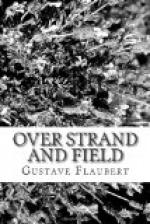She was beautiful also among the goat-skins of the Cossacks and the English uniforms, pushing her way through the throngs of men and letting her bare shoulders dazzle them on the steps of the gambling houses, under the jewellers’ windows, beneath the lights of the cafes, between starvation and wealth.
What are you regretting? I am regretting the fille de joie.
On the boulevard, one evening, I caught a glimpse of her as she passed under the gaslight, with watchful and eager eyes, dragging her feet over the sidewalk. I saw her pale face on the street-corner, while the rain wet the flowers in her hair, and heard her soft voice calling to the men, while her flesh shivered in her low-necked bodice.
It was her last day; after that she disappeared.
Fear not that she will ever return, for she is dead, quite dead! Her dress is made high, she has morals, objects to coarse language, and puts the sous she earns in a savings bank.
Cleared of her presence, the street has lost the only poetry it still retained; they have filtered the gutter and sorted the garbage.
In a little while, the mountebanks will also have disappeared, in order to make room for magnetic seances and reform banquets, and the rope-dancer with her spangled skirt and long balancing-pole will be as remote from us as the bayadere of the Ganges.
Of all that beautiful, glittering world as flighty as fancy itself, so melancholy and sonorous, so bitter and yet so gay, full of inward pathos and glaring sarcasms, where misery was warm and grace was sad, the last vestige of a lost age, a distant race, which, we are told, came from the other end of the earth and brought us in the tinkling of its bells the echo and vague memory of idolised joys; some covered wagon moving slowly along the road, with rolled tents on its roof and muddy dogs beneath it, a man in a yellow jacket, selling muscade in tin cups, the poor marionnettes in the Champs-Elysees, and the mandolin players who visit the cafes in the outskirts of the city, are all that is left.
Since then, it is true, we have had a number of farces of a higher class of humour. But is the new as good as the old? Do you prefer Tom Thumb or the Museum of Versailles?
On a wooden stand that formed a balcony around a square tent of grey canvas, a man in a blouse was beating a drum; behind him was a big painted sign representing a sheep and a cow, and some ladies, gentlemen, and soldiers. The animals were the two young phenomena from Guerande, with one arm and four shoulders. Their exhibitor, or editor, was shouting himself hoarse and announcing that besides these two beautiful things, battles between wild beasts would take place at once. Under the wooden stand stood a donkey and three bears, and the barking of the dogs, which proceeded from the interior of the tent, mingled with the beating of the drum, the shouts of the owner of the two phenomena and the cries of another fellow who was not as jovial and fat as the former, but tall and lanky, with a funereal expression and ragged clothes. This was the partner; they had met on the road and had combined their shows. The lean one contributed his bears, his dogs and his donkey, while the fat man brought his two phenomena and a grey felt hat which was used in their performance.




